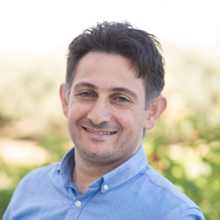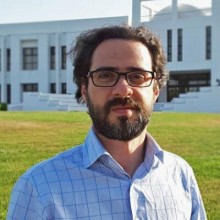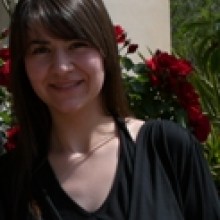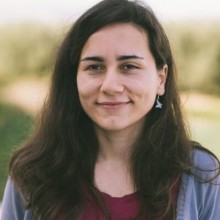Position Description
Ο/Η υποψήφιος/α αναμένεται να συμβάλει στην πραγματοποίηση μη γραμμικών απεικονιστικών μετρήσεων για την απόκτηση καινοτόμων πληροφοριών που σχετίζονται με θεμελιώδεις βιολογικές διεργασίες και βασικά υποκυτταρικά χαρακτηριστικά βιολογικών δειγμάτων.
Για το πλήρες κείμενο της πρόσκλησης ακολουθήστε τον σύνδεσμο "Related Documents", αριστερά
Required Qualifications
- Πτυχίο Θετικών Επιστημών
- Μεταπτυχιακό Δίπλωμα Ειδίκευσης (MSc) από Ανώτατο Εκπαιδευτικό Ίδρυμα της ημεδαπής ή αλλοδαπής σχετικό με εφαρμογή φασματοσκοπικών τεχνικών στην Βιολογία
- Εμπειρία σε απεικόνιση βιολογικών δειγμάτων με χρήση υπέρστενων παλμών λέιζερ
- Επιστημονικές δημοσιεύσεις, παρουσιάσεις σε διεθνή συνέδρια
Desirable Qualifications
- Εμπειρία σε ανάπτυξη και αναβάθμιση πρότυπων πειραματικών διατάξεων για απεικόνιση βιολογικών δειγμάτων σε μικροσκοπικό επίπεδο
- Γνώση Αγγλικής γλώσσας
Application Procedure
Στο φάκελο υποβολής της πρότασης κάθε ενδιαφερόμενου θα πρέπει να εμπεριέχονται τα ακόλουθα:
- Αίτηση (Form Greek στην αριστερή στήλη) με αναφορά στον κωδικό της θέσης 51α και στο πρόγραμμα
- Αναλυτικό Βιογραφικό Σημείωμα
- Ευκρινή φωτοαντίγραφα τίτλων σπουδών
- Πρόσφατη βεβαίωση σπουδών υποψήφιου διδάκτορα
Appointment Duration
4 μήνεςPosition Description
Παραγωγή & χαρακτηρισμός υβριδικών υδρογελών πεπτιδίων-πορφυρίνης για χρήση σε βιοϊατρικές εφαρμογές (ΕΕ 2). Το βασικό δομικό πλαίσιο θα αποτελείται από διπεπτίδια είτε αρωματικών αμινοξέων (διφαινυλαλανίνης) είτε αλειφατικών αμινοξέων (αλανίνης-ισολευκίνης). Ο υποψήφιος/α θα μελετήσει την αυτοοργάνωση των πεπτιδικών δομικών λίθων με τεχνικές Ηλεκτρονικής Μικροσκοπίας Διέλευσης (TEM), Ηλεκτρονικής Μικροσκοπίας Σάρωσης (SEM) η/και περίθλαση ινών. Θα εξεταστεί η επίδραση διαφόρων παραγόντων ως προς τον σχηματισμό υδρογελών (διαλύτες, θερμοκρασία και συγκέντρωση) και θα μελετηθεί η ελεγχόμενη αποδέσμευση εγκαψυλιωμένων πορφυρινών.
Για το πλήρες κείμενο της πρόσκλησης ακολουθήστε τον σύνδεσμο "Related Documents", αριστερά
Required Qualifications
- Πτυχίο Χημείας/Βιολογίας/Επιστήμης Υλικών ή συναφές
- Διδακτορικό Δίπλωμα σε συναφή πεδία
- Εμπειρία με παραγωγή και μελέτη πρωτεϊνών και πεπτιδίων
- Δημοσιεύσεις σε έγκυρα επιστημονικά περιοδικά με κριτές
- Άριστη γνώση της Αγγλικής γλώσσας
Application Procedure
Στο φάκελο υποβολής της πρότασης θα πρέπει να εμπεριέχονται τα ακόλουθα:
- Αίτηση (Form Greek στην αριστερή στήλη) με αναφορά στον κωδικό της θέσης 6γ και στο όνομα του προγράμματος
- Αναλυτικό Βιογραφικό Σημείωμα
- Ευκρινή φωτοαντίγραφα τίτλων σπουδών
Appointment Duration
12 μήνες
Education
- 2009, Ph.D. Physics Department, University of Athens, Greece
- 2004, M.Sc., Physics Department, University of Athens, Greece
- 2002, B.Sc. Physics Department, University of Athens, Greece
Career
- 2018 - 2019, Senior Research Fellow, Zepler Institute for Photonics and Nanoelectronics, Univ. of Southampton, UK
- 2016 - 2018, Research Fellow, Electronics & Computer Science (ECS), Univ. of Southampton, UK
- 2015 - 2016, Marie - Curie Fellow, IMM-CNR, Rome, Italy
- 2011 - 2014, Research Associate, Physics Dept., University of Athens, Greece
Interests
- AI for micro/ nano electronics
- RF MEMS
- Metal-Oxide Memristors
- Semiconductor Materials and Devices
- Microwave Microscopy
- Science Outreach
Position Description
Εναποθέσεις NiO (με ή χωρίς προσμίξεις) με την τεχνική του sputtering, διαμόρφωση της επιφάνειας του in situ (κατά την εναπόθεσή του) ή ex situ (ακτινοβόληση), χαρακτηρισμός του υλικού, εφαρμογή σε υβριδικά φωτοβολταϊκά-περοβσκίτες.
Για το πλήρες κείμενο της πρόσκλησης ακολουθήστε τον σύνδεσμο "Related Documents", αριστερά
Required Qualifications
- Πτυχίο Φυσικής ή Επιστήμης Υλικών
- Γνώσεις φυσικής στερεάς κατάστασης, ημιαγωγών, ημιαγώγιμων διατάξεων και βασικής χημείας
- Γνώσεις χαρακτηρισμού υλικών (δομικές, φυσικές, κλπ. ιδιότητες)
- Καλή γνώση αγγλικών (γραπτά και προφορικά)
Desirable Qualifications
- Εμπειρία στην ανάλυση αποτελεσμάτων με χρήση υπολογιστικών προγραμμάτων-εργαλείων
- Εμπειρία στην συγγραφή κειμένων με χρήση υπολογιστικών προγραμμάτων-εργαλείων
Application Procedure
Στο φάκελο υποβολής της πρότασης θα πρέπει να εμπεριέχονται τα ακόλουθα:
- Αίτηση (Form Greek στην αριστερή στήλη) με αναφορά στο πρόγραμμα και στον κωδικό της θέσης 6
- Αναλυτικό Βιογραφικό Σημείωμα
- Ευκρινή φωτοαντίγραφα τίτλων σπουδών
- Πρόσφατη βεβαίωση μεταπτυχιακών σπουδών
Appointment Duration
10 μήνεςTo: 05/02/2020 14:00
Recently, in the field of bio-inspired materials, the non-covalent self-assembly of relatively simple peptide based molecules has gained increasing attention for the formation of nanostructured, biologically functional materials, including nanofibers and hydrogels, all with nanoscale order. Moreover, polypeptide self-assembly is often associated with human medical disorders. Understanding the physicochemical determinants that underlie peptide self-assembly is a fundamental step, in view of the rational design, or redesign of already existed nano building blocks for biotechnological and biomedical applications. The theoretical principles that govern self-assembly and polymorphism of these building blocks are currently unknown. Computer simulations contribute to the clarification of some of the basic questions related to structural, conformational and dynamical properties of these molecules from first principles. Therefore, one part of our work concerns the modeling of small biological molecules, such as peptides and lipids as well as of proteins, where the self-assembly propensity and the conformational properties, are studied through all-atom Molecular Dynamics simulations using an explicit solvent model.
More complex systems constitute another direction of our work, which concerns the modeling of m-RNA molecules which are suggested as navigators of ribonucleoproteins for individual breast cancer therapy. Through atomistic Molecular Dynamics simulations the detailed structure-properties relations of such bioactive complexes will be explored in the atomic level. Our main goal is to study the associative behavior between RNA and an ionizable lipid in an aqueous environment and at physiological pH conditions. This will provide important information regarding the different stages involved in the complexation process and will assess the potential of the formed complex to be part of a delivery mechanism for the nucleic acid cargo. The detailed information obtained though this study, may provide new insight towards a rational design of optimized lipid-based gene delivery vectors.
Η τροποποίηση των ιδιοτήτων της επιφάνειας στη μίκρο/νάνο κλίμακα και η συνεπαγόμενη αύξηση της τραχύτητας, συνεπώς και της ενεργού επιφάνειας, διαδραματίζει σημαντικό ρόλο στη βελτιστοποίηση των επιδόσεων ενός υλικού για συγκεκριμένες εφαρμογές. Για παράδειγμα τα φαινόμενα διαβροχής, ανακλαστικότητας, τριβής και πρόσφυσης που λαμβάνουν χώρα στη διεπιφάνεια μεταξύ υλικών επηρεάζονται έντονα από το μέγεθος και το σχήμα των επιφανειακών μικροδομών. Σκοπός του NanoRoll είναι η ανάπτυξη και η παραγωγή λειτουργικών επιφανειών με συνεχής (roll-to-roll) λιθογραφικές διαδικασίες. Στόχος είναι η μεταστροφή της παραγωγικής διαδικασίας από διακοπτόμενη (batch-to-batch) σε συνεχή συνδυάζοντας την λιθογραφία με χρήση δέσμης λέιζερ και τηςκ υλινδρικής νανοεκτυπωτικής λιθογραφικής μεθόδου (R2RNIL). Η πρόσβαση σε υψηλής συχνότητας/παλμού και ενέργειας λέιζερ και ο συγχρονισμός για τη λιθογραφία σε κυλινδρικά μεταλλικά υποστρώματα (μήτρες/καλούπια) προσφέρεται ως μια εναλλακτική μέθοδος για την παραγωγή μητρών συμβατών με τη νανοεκτυπωτική λιθογραφική μέθοδο. Αποτελεί πρόκληση η δημιουργία ιεραρχημένων δομών συνδυάζοντας μίκρο και νάνο δομές στην ίδια επιφάνεια προσδίδοντας ένα συγκριτικό πλεονέκτημα για παραγωγή φτηνών και εύκαμπτων λειτουργικών επιφανειών. Η λιθογραφία NIL βρίσκεται στον οδικό χάρτη των ημιαγωγών (ITRS roadmap) ως μια ανερχόμενη και πολλά υποσχόμενη λιθογραφική μέθοδος για την επίτευξη (υπο-10 nm) υψηλής λιθογραφικής ευκρίνειας. Το 2015 η παγκόσμια αγορά νανο-σχηματομόρφωσης ανήλθε στα 1,9 Β$ και υπολογίζετε ότι θα φτάσει τα 19.1 Β$ μέχι το 2020. Η τεχνολογία NIL αντιπροσωπεύει το 82,9% της συνολικής αγοράς νανο-σχηματομορφωτικών διαδικασιών καθώς το 72.8% αυτή ανήκει στην τεχνολογία UV-NIL. Το 2020 προβλέπεται ότι η τεχνολογία UV-NIL θα ξεπεράσει τα 1.4 Β$.
Οι κύριοι στόχοι της πρότασης NanoRoll είναι: (i) πρόσβαση και εφαρμογή της λιθογραφίας δέσμης λέιζερ για την κατασκευή υψηλής ευκρίνειας δομών με συνεχή τοπογραφίες και υψηλή απόδοση, (ii) σχεδίαση, δημιουργία και αναπαραγωγή ιεραρχημένων (μίκρο/νάνο) δομών με συνεχείς λιθογραφικές διαδικασίες, (iii) πιστοποίηση και πιλοτική παραγωγή μεγάλης έκτασης (100 m2) λειτουργικών επιφανειών με αυτό-καθοριζόμενες ιδιότητες. Η πρόταση NanoRoll θεωρούμε ότι θα αποδώσει οφέλη λόγω της ισχυρής μείωσης της αλυσίδας βιομηχανικής παραγωγής. Τέλος, με βάση την περιγραφή των εκμεταλλεύσιμων αποτελεσμάτων για κάθε εμπλεκόμενο μέλος θα εκπονηθεί ένας χάρτης εκμετάλλευσης ή/και εμπορευματοποίησης, συμπεριλαμβανομένων ποσοτικών εκτιμήσεων σχετικά με το οικονομικό αντίκτυπο.
This project is focused on developing efficient smart materials with energy harvesting and storage capabilities combining advanced polymer based-composite materials into a novel single/multi-source concept to harvest electrical energy from mechanical energy and/or waste heat ambient sources.
Funding

This project aims to develop novel materials (perovskites) as gas sensing elements. A second challenge will be to address gas selectivity, which could be a major breakthrough in sensor technology. At the end of this project, we aim to fabricate a prototype “nano” gas sensor, adaptable to smart/portable devices, which can be used to monitor the quality of breathing air in homes, cities. Such sensor can also be implemented in other sectors, such as in transportation, industry and agricultural production
Funding

Lasergraph: “In-situ laser fabrication of graphene electrodes and interlayers for next generation CIGS/Perovskite solar cells”
This project is focused on the application of in-situ laser processing schemes for the development of graphene-based interlayers and TCEs, incorporated within CIGS/Perovskite tandem PV cells.
Funding Scheme: FLAG-ERA, ERA.net
Funding

Digital printing of nanoinks complemented by direct laser sintering enables the mass production of digital conductive and dielectric patterns, which is advantageous for the performance of existing additive manufacturing technologies in multiple ways. In particular, it is digital, non-contact, and it enables 2.5D and 3D printing, it is a cleaner process (when compared with etching and screen printing), suitable for flexible and temperature sensitive substrates and efficient in the usage of inks, i.e. of low cost. Moreover, the use of nanoinks leads to products with improved properties, including lower resistivities, improved adhesion, high aspect ratios and high-resolution line patterns. The project follows a clear market pull approach for the introduction of nanoparticle-based materials into the production line. This technique is considered as an unconditional requirement in order to improve the product properties while increasing the efficiency of the production line in printed electronics applications. The project aims to develop a game changing technology integrating not only nano-Silver, but also nano-Copper and Barium Titanate inks, which will be much cheaper, while showing similar electrical properties. This new technology will enable higher aspect ratios and narrower patterning, as well as lower resistivities and better adhesion at lower sintering temperatures. At the same time, the project aims to create a production line meeting the customer’s needs and following the popular trend towards sustainability and environmental friendliness.
In the SINTERINK project, we develop and demonstrate the technology in operational environment for a manufacturing process incorporating digital multilayer inkjet conductive and dielectric printing (silver, copper and barium titanate single-crystal nanoparticle inks) complemented by direct laser sintering. The process will be demonstrated for the specific product case of inkjet-printed metallic grids for photovoltaics as well as dielectrics for embedded capacitors.
Partners:
Vector Technology, Greece
Eulambia, Greece
Digiflex Printing, Israel
PV Nanocell LtD, Israel














